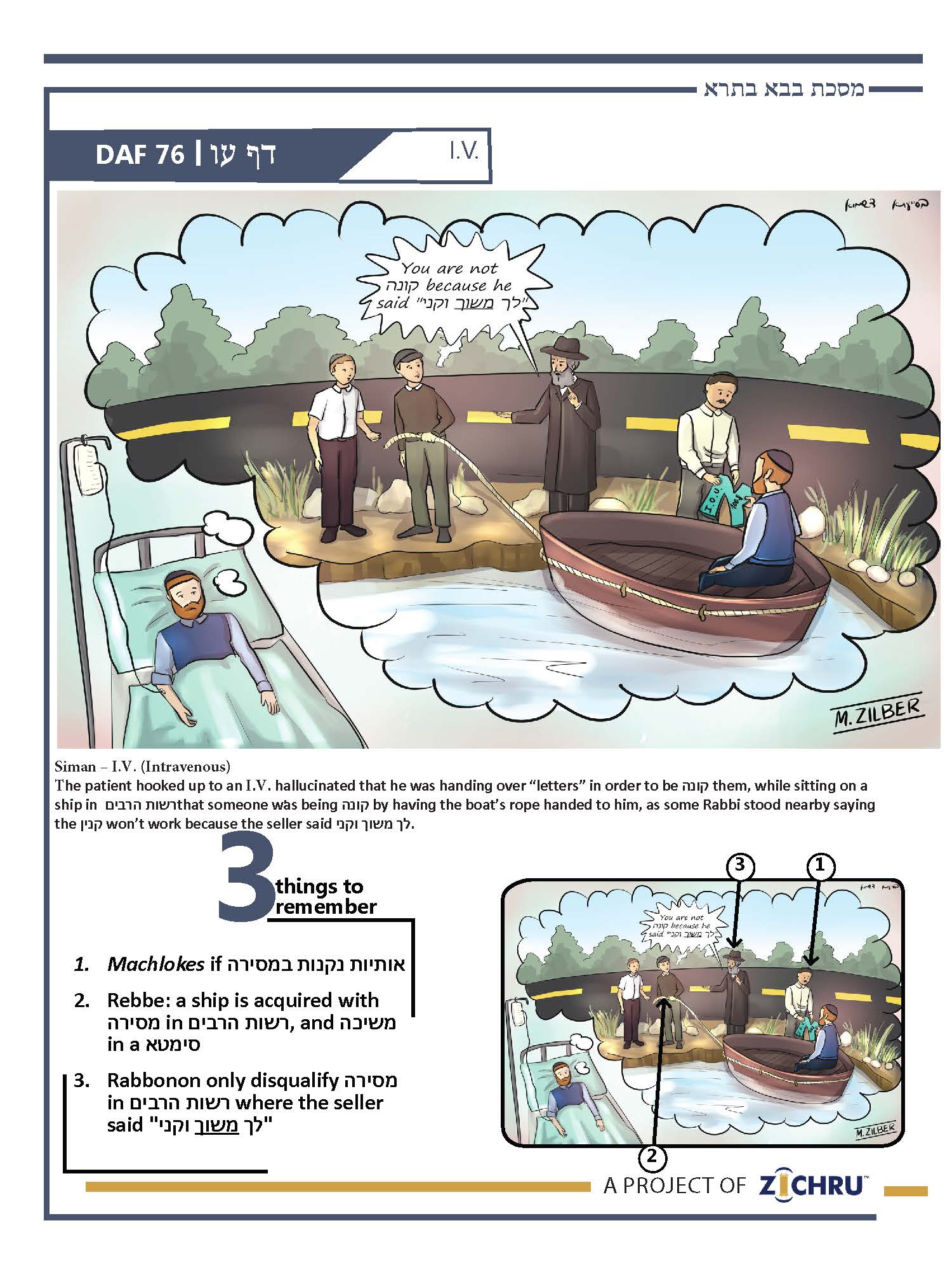Bava Basra - Daf 76
- Audio Timestamps
0:00 - The 3 Sugyos
3:14 - Review of 3 Sugyos
6:08 - Siman
8:20 - 4 Blatt Back Chazarah
14:22 - Pop Quiz (Last 7 blatt)
For access to all Zichru resources including PDFs, and illustrations CLICK HERE
- Machlokes if אותיות נקנות במסירה
A Baraisa is quoted, which is eventually emended to read: ספינה נקנית במשיכה – a ship is acquired with pulling, ואותיות במסירה - and “letters” (i.e., a debt recorded in a שטר) are acquired with handing over, according to the Tanna Kamma. Rebbe Nassan says: ספינה במשיכה ואותיות בשטר – a ship is acquired with משיכה, and “letters” are acquired with a שטר stating that the debt was transferred (in addition to מסירה; both are required). Since both say a ship is acquired with משיכה, the Gemara suggests they argue how much משיכה is required (the machlokes between Rav and Shmuel on the previous Daf). However, the Gemara says they may agree about a ship, and only argue about acquiring שטרות. Other Tannaim also argue about acquiring שטרות. In a Baraisa, Rebbe says "אותיות" are acquired with במסירה, and the Rabbonon say that whether the seller only wrote a שטר of sale, or only handed them over, לא קנה עד שיכתוב וימסור – he has not acquired [the שטרות] until [the seller] writes a שטר of sale and hands over the שטרות. Later, Rav Ashi wonders why writing a שטר of sale is necessary: וכי לצור על פי צלוחיתו הוא צריך – does [the buyer] need [the שטר חוב] to wrap over the mouth of his flask?! Rav Kahana responded: אין לצור ולצור – Yes, to wrap and to wrap!
- Rebbe: a ship is acquired with מסירה in רשות הרבים, and משיכה in a סימטא
The above Baraisa, which states that a ship is acquired with משיכה, was attributed to Rebbe. The Gemara objects that Rebbe said in another Baraisa: ספינה נקנית במסירה – a ship is acquired with handing over!? [The Chochomim there say he does not acquire it עד שימשכנה או עד שישכור את מקומה – until he pulls it or rents its place.] The Gemara answers: כאן ברשות הרבים – [the second Baraisa] is where [the ship] is in a public thoroughfare. Since משיכה cannot be performed in רשות הרבים, he can acquire the ship with מסירה. כאן בסימטא – [the first Baraisa] is where it is in a “simta” (the area to the side of רשות הרבים, which one can make like his own when performing משיכה). The Rabbonon disagreed with Rebbe’s validating מסירה, and instead required משיכה or renting its place. Since neither can be effective in רשות הרבים, the Gemara explains they mean: עד שימשכנה מרה"ר לסימטא – he does not acquire the ship until he pulls it from רשות הרבים to a סימטא (where משיכה is effective); if it is located in the owner’s property, he must rent its place from the owner.
- Rabbonon only disqualify מסירה in רשות הרבים where the seller said "לך משוך וקני"
It emerges that Rebbe says one can acquire a ship in רשות הרבים with מסירה, and the Rabbonon say he cannot. The Gemara asks that Abaye and Rava said one can acquire with מסירה in רשות הרבים; do they rule like Rebbe, against the majority opinion of the Rabbonon?! Rav Ashi answers that if the seller simply said: לך חזק וקני – “Go make a chazakah and acquire it,” the Rabbonon would agree that מסירה is effective in רשות הרבים. They argue in a case where the seller said: "לך משוך וקני" – “Go pull the ship and thereby acquire it,” in which case the Rabbonon hold his instruction was קפידא – insistence to be done specifically with משיכה, so מסירה is not effective [the Rashbam explains that the seller wanted to reserve the ability to retract during the time needed to perform משיכה]. Rebbe holds: מראה מקום הוא לו – he was only showing him a way to acquire it but was not particular on the method used.
Siman – I.V. (Intravenous)
The patient hooked up to an I.V. hallucinated that he was handing over “letters” in order to be קונה them, while sitting on a ship in רשות הרביםthat someone was being קונה by having the boat’s rope handed to him, as some Rabbi stood nearby saying the קנין won’t work because the seller said לך משוך וקני.


